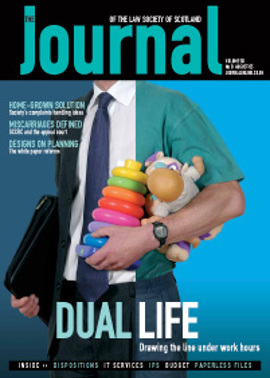Missing a generation

The issue of the rights of grandparents has been sharply focused in the discussions surrounding the Family Law (Scotland) Bill.
The importance of grandparents to family life cannot be overstated. The Grandparents’ Association website www.grandparents-association.org.uk includes the statistics that there are an estimated 13.5 million grandparents in the UK; 60% of all childcare is provided by grandparents; and one in every 100 children lives with a grandparent.
There is nevertheless no provision in the bill for a grandparent automatically to obtain parental responsibilities and rights. The Executive has taken on board the fact that 59% of respondents to the consultation preceding the bill considered that such automatic rights were not appropriate for grandparents.
It is submitted that this must be the correct approach. In the majority of families, children will see their grandparents, regularly or occasionally, and derive some benefit from that relationship. Where difficulties arise between the adults, arrangements to continue the relationship may be made voluntarily, whether directly between the individuals or through solicitors, or imposed by the courts.
Rights and their exercise
In placing such store on “automatic” parental rights and responsibilities there is perhaps a misapprehension on the part of grandparents’ pressure groups about the strength of their position if they held such rights. It is clear from White v White 2001 SLT 485 that there is no presumption that it is in a child’s best interests for a person with parental rights and responsibilities to exercise them. A grandparent refused contact by the parent with care will require to raise an action seeking a contact order. On one view a grandparent with “automatic” parental rights and responsibilities will be in no better position than a grandparent without such rights: they will still require to convince the court that contact is in the child’s best interests.
A flexible framework
Two recent decisions demonstrate the necessity of taking a case by case approach.
In PC & RC v LK & GK, Sheriff McLernan at Aberdeen, 15 October 2004 and 22 February 2005, maternal grandparents sought orders in relation to their three year old grandson. The child had lived with them from soon after birth as his mother was a drug addict and his father worked offshore. The child had suffered from neonatal dependency syndrome. The child was being “singularly well looked after” by the grandparents. While the child’s father had initially had a good relationship with the grandparents, this deteriorated after he requested residence of the child. The father considered that he had an automatic right to residence (a notion perhaps fostered by the social work department, despite the findings of a number of children’s hearings). While the grandparents had facilitated contact with him, the father regarded the mother and her parents as opponents. The grandparents were slowly reintegrating the mother, now recovered from her addiction, into the child’s life and would continue to facilitate contact with the father. The father, if granted residence, would prevent links with the mother.
Sheriff McLernan made an order conferring parental rights and responsibilities and a residence order on the grandparents. Contact between the child and his father was agreed.
It is interesting to note the policy of the social work department involved that a child should be placed with a parent whenever possible. There was apparently no attempt to assess which placement in the wider scheme of things would be in the child’s best interests. The court was able to undertake that exercise under the present framework and concluded that it was in the child’s best interests to remain with his grandparents.
By contrast, in DN v LJ and Fife Council, Sheriff Evans at Cupar, 21 October 2004, unrelated foster parents were preferred to the paternal grandmother as permanent carers of a two year old boy.
The grandmother had applied for orders in an effort to prevent the child being freed for adoption and placed outwith the family. There was evidence that her interest in the child came rather late and that she would have difficulty in preventing the child coming into contact with the various members of her own family, and the child’s mother, who were drug addicts. It was found that the child was happy and well settled with his foster carers and that moving him would have a devastating effect. Accordingly Sheriff Evans refused to grant parental rights and responsibilities, a residence order or a contact order in favour of the grandmother, leaving the way open for a petition to free the child for adoption.
Recent case law therefore supports the view that the current position allows grandparents’ rights to be recognised where that is in the best interests of the child, without the need for legislative intervention. Put shortly, it is the best interests of the child that are paramount and not the interests of the grandparents – however well meaning.
Rachel Shewan, Associate in the Morton, Fraser Family Law Team
In this issue
- Prosecuting bigotry offences
- A hotter than average July
- Advice for all, but what about justice?
- Calling time
- The anti-avoidance drive
- The best option?
- Radical design
- Miscarriages of justice
- Information technology
- IPS... keeping a watchful eye
- When less means better
- Reality check - not Big Brother
- A clear duty
- Missing a generation
- Does age matter?
- Fair picture?
- Book debts: the final word?
- Website reviews
- Book reviews
- Challenging the sacred cows of conveyancing






